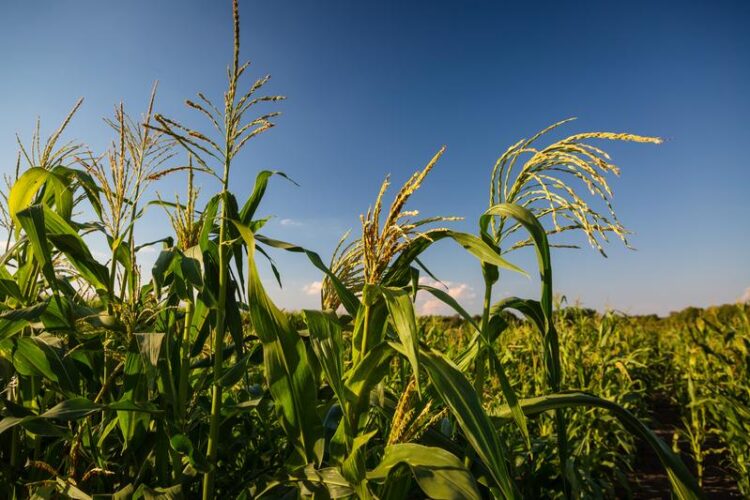Climate-adapted plant breeding

An verschiedenen Standorten in Europa mit unterschiedlichen klimatischen Bedingungen haben die Forscher im Team von Prof. Chris-Carolin Schön alte Maissorten angebaut, um ihr genetisches Potenzial zu untersuchen.
Tom Freudenberg/pict-images
Verwendung frei für die Berichterstattung über die TUM bei Nennung des Copyrights
Improvement of crops with seeds from gene banks
Securing plant production is a global task. Using a combination of new molecular and statistical methods, a research team from the Technical University of Munich (TUM) was able to show that material from gene banks can be used to improve traits in the maize plant. Old varieties can thus help to breed new varieties adapted to current and future climates.
The famous seed vault in Spitsbergen and national gene banks retain hundreds of thousands of seed samples to preserve old varieties of crop plants and the genetic diversity associated with them. Are these seed banks gold mines or seed cemeteries?
Researchers around the globe are investigating whether retained samples contain genes that have been lost through breeding which could be beneficial in counteracting climate change. A research team led by Chris-Carolin Schön, Professor of Plant Breeding at the TUM, is now presenting a solution to harness the genetic potential of old varieties, so-called landraces.
Have good plant characteristics been lost through breeding?
Since the 1960s, maize has been grown in Europe’s fields mainly in the form of hybrid varieties. Hybrid varieties are developed through a specific breeding scheme and, for example are “trimmed” for high yield per hectare or low susceptibility to pests. In order to breed the best variety, a kit of characteristics is needed that could be relevant both today and in the future. Thus, genetic diversity is the basic prerequisite for breeding improved crop plants.
Hybrid varieties, however, carry only a small selection of traits compared to old varieties, the landraces. The question then is whether in addition to undesirable traits, beneficial traits have been lost in the course of many breeding generations. Therefore, the call for landraces has recently been revived, as they are characterized by high biodiversity and are considered a natural source of new genetic variation for breeding. Genetic variation reflects different variants of a gene and can be recognized by differences in the plant’s appearance.
Cold-tolerant varieties: Are they the winners in times of climate change?
The early development of young plants is of particular importance in times of climate change. Drought and heat are the conditions most damaging to crops, such as maize, when they occur during flowering. When a plant can be cultivated early in the year because it can cope with cold, it has already left its flowering period behind when temperatures are particularly high in summer. This means that it is less damaged and yield losses can be avoided.
Professor Schön and her colleagues have been examining landrace varieties for cold tolerance characteristics. For this purpose, they have developed a genome-based method of identifying and making targeted use of beneficial gene resources. After a preliminary study, in which the researchers identified the genetic differences of individual varieties, the researchers selected three landraces for cultivation in different locations with varying climatic conditions within Europe.
Landraces provide advantageous genes for crop improvement
The research team focused on traits related to early plant development and also took into account the stability of the plant (How well does it withstand wind?) and the growth form (straight or bushy?). Using molecular methods that scan the entire genome, they were able to link the data from the field trials to genes relevant to the specific traits.
“We have shown how to find new genetic variation for important traits in agricultural production. The variation in these traits is determined by many genes and is not sufficiently available in current breeding material,” says Manfred Mayer, lead author of the study. “This opens the door to the development of improved climate-adapted hybrid varieties.”
Wissenschaftliche Ansprechpartner:
Prof. Dr. Chris-Carolin Schön
Technical University of Munich
TUM School of Life Sciences
Chair of Plant Breeding
Tel.: +49 8161 71-3421
E-Mail: chris.schoen@tum.de
Manfred Mayer
Scientist at the Chair of Plant Breeding
Tel.: +49 8161 71-6146
E-Mail: manfred.mayer@tum.de
Originalpublikation:
Manfred Mayer, Armin C. Hölker, Eric González-Segovia, Eva Bauer, Thomas Presterl, Milena Ouzunova, Albrecht E. Melchinger & Chris-Carolin Schön (2020): Discovery of beneficial haplotypes for complex traits in maize landraces. In: Nature Communications https://www.nature.com/articles/s41467-020-18683-3
Weitere Informationen:
https://www.wzw.tum.de/index.php?id=2&L=1 (TUM School of Life Sciences)
https://www.plantbreeding.wzw.tum.de/en/startseite/ (Chair of Plant Breeding)
https://mediatum.ub.tum.de/1578802 (high resolution images)
https://www.tum.de/nc/en/about-tum/news/press-releases/details/36306/ (press release)
https://www.professoren.tum.de/en/schoen-chris-carolin (Prof. Schön)
http://www.europeanmaize.net/
Media Contact
All latest news from the category: Agricultural and Forestry Science
Newest articles

You are What You Eat—Stanford Study Links Fiber to Anti-Cancer Gene Modulation
The Fiber Gap: A Growing Concern in American Diets Fiber is well known to be an important part of a healthy diet, yet less than 10% of Americans eat the minimum recommended…

Trust Your Gut—RNA-Protein Discovery for Better Immunity
HIRI researchers uncover control mechanisms of polysaccharide utilization in Bacteroides thetaiotaomicron. Researchers at the Helmholtz Institute for RNA-based Infection Research (HIRI) and the Julius-Maximilians-Universität (JMU) in Würzburg have identified a…

ASXL1 Mutation: The Hidden Trigger Behind Blood Cancers and Inflammation
Scientists show how a mutated gene harms red and white blood cells. LA JOLLA, CA—Scientists at La Jolla Institute for Immunology (LJI) have discovered how a mutated gene kicks off…



